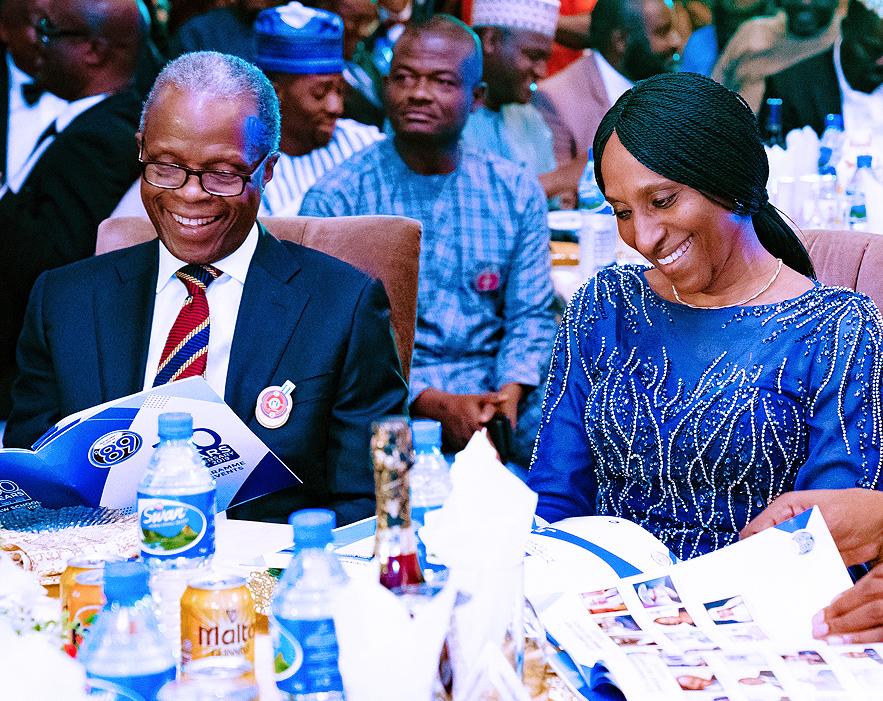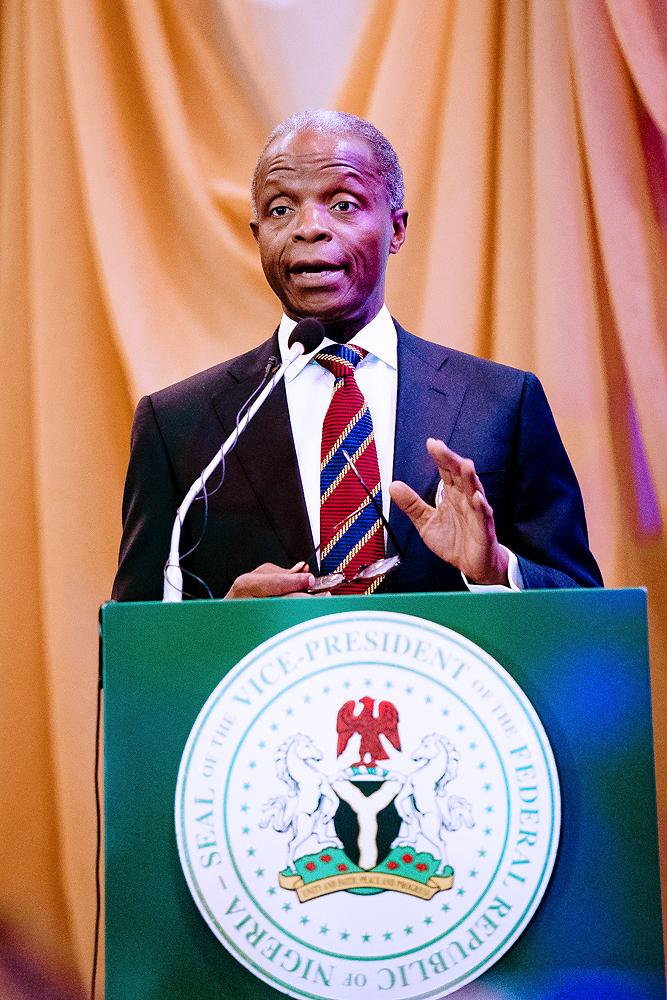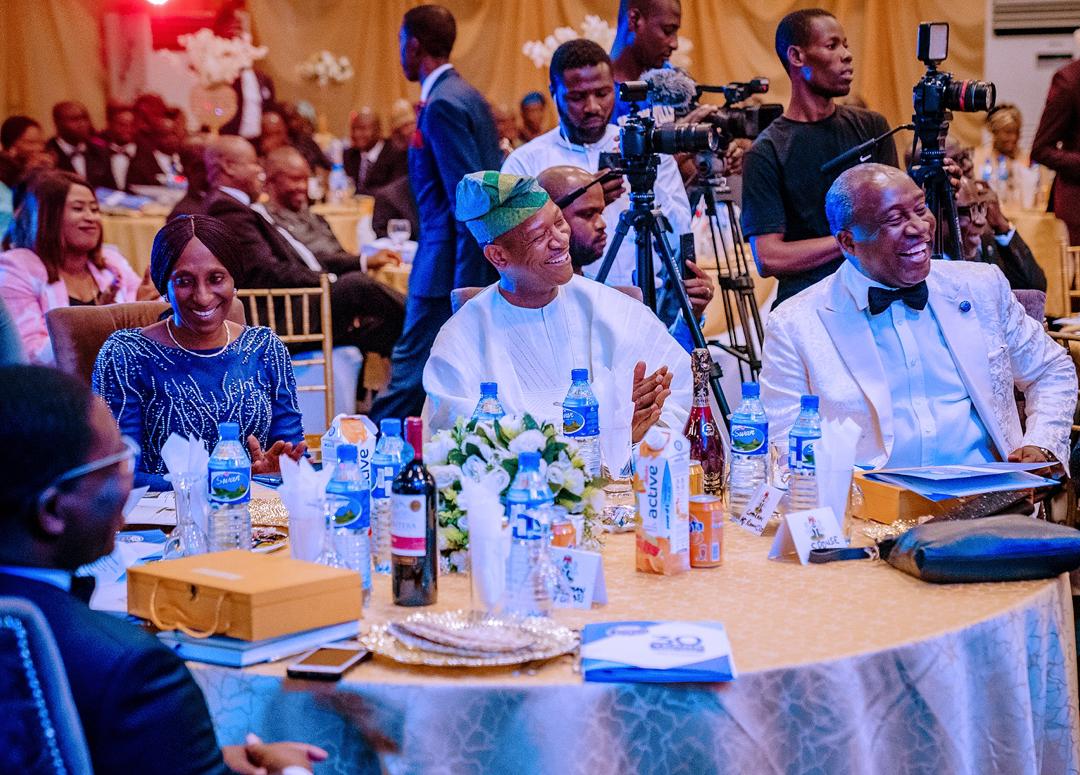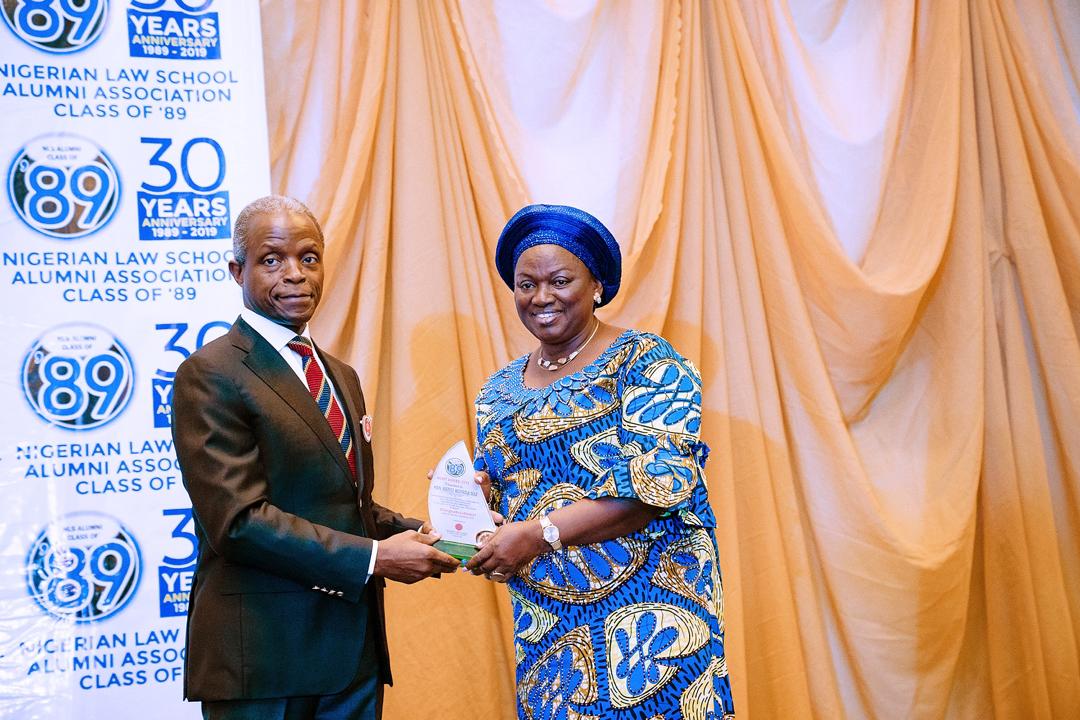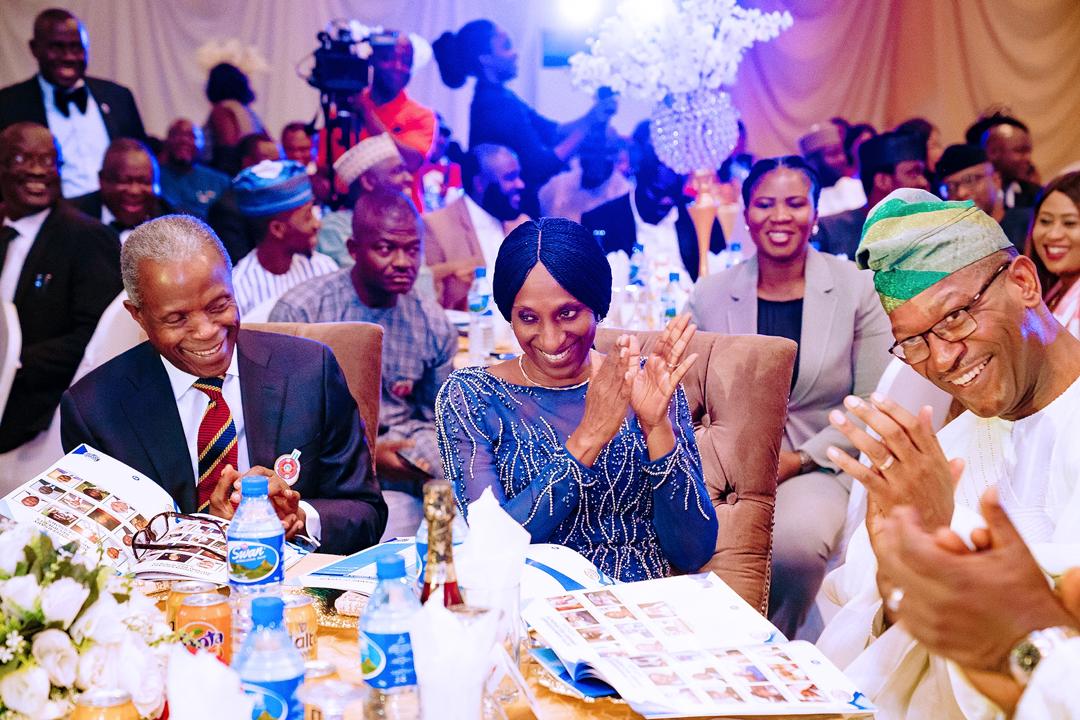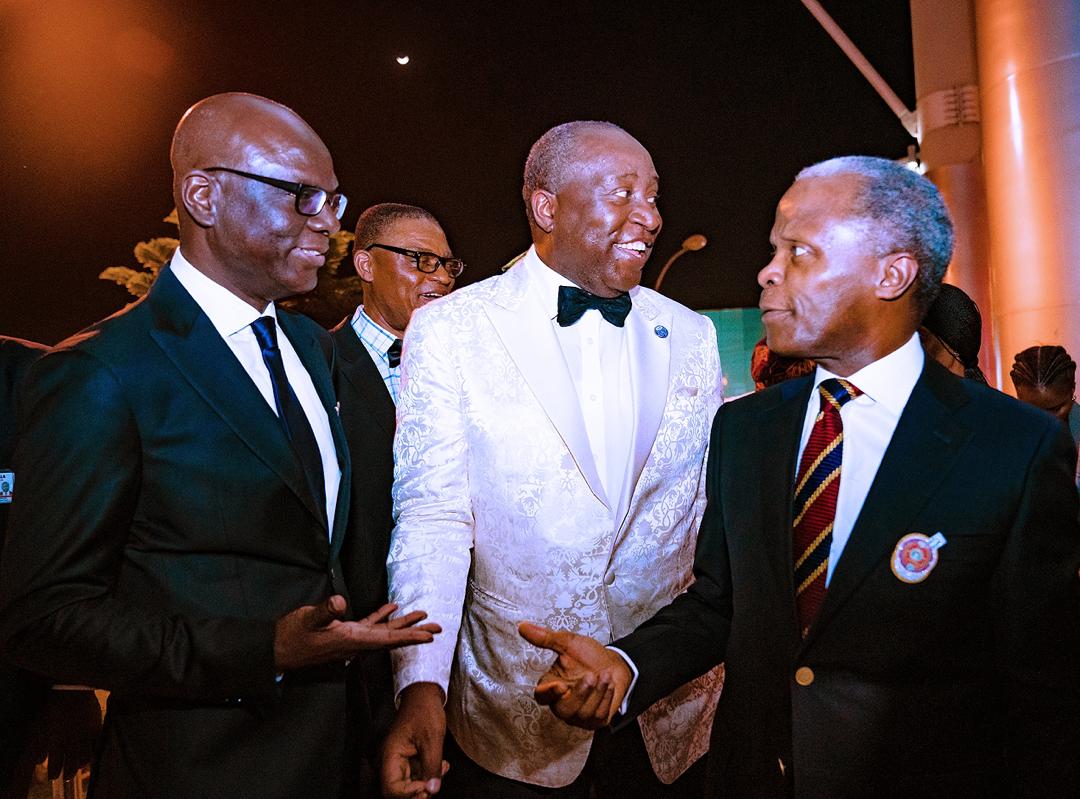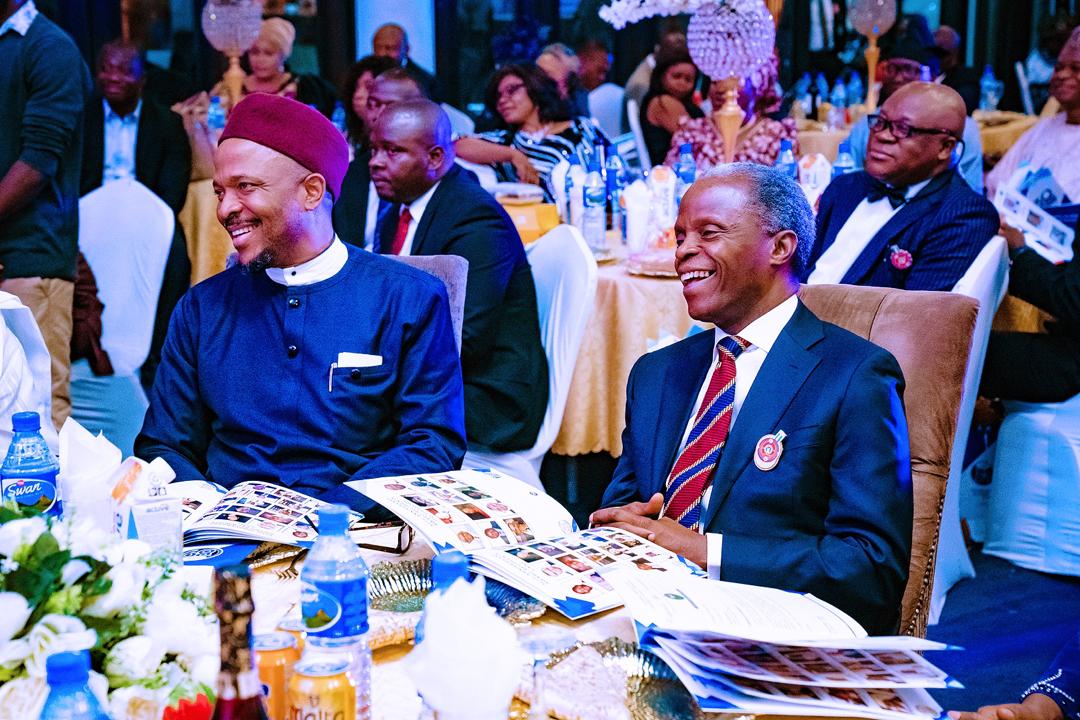Anniversary Dinner & Awards Ceremony Of The Nigerian Law School, Class Of 1989
REMARKS BY HIS EXCELLENCY, PROF. YEMI OSINBAJO, SAN, GCON, VICE PRESIDENT OF THE FEDERAL REPUBLIC OF NIGERIA, AT THE ANNIVERSARY DINNER AND AWARDS CEREMONY OF THE NIGERIAN LAW SCHOOL CLASS OF 1989, ON THE 30TH OF NOVEMBER, 2019
PROTOCOLS
I am honoured to have been invited to speak at this anniversary dinner and award ceremony in honour of the members of the Nigerian Law School class of 1989. I must say that only the most altruistic and the most introspective ever think in terms of alumni associations because it’s about giving back. So, I commend your class for your thoughtfulness and generosity especially for the donation of the much-needed e-portal that was donated to the Law School. As for the matter of whether your class is the best, Emeka Etiaba has pointed out that marrying from this class, because I married from this class, I stopped from contesting this fight. I will do so, I will accept my lords, expect that the matter of owing the class a bride price is as you know after 30 years – statute-barred.
I congratulate all the award recipients and I must say that the awards are certainly well deserved. Emeka Nwajiuba was trying to persuade me that this class has the highest number of high court judges, professors and everything. But we are still looking into the matter, I pointed out that my class which is the class of 1979, we were barely 300. So, in terms of proportion, I suspect that your class was nearly 3,000. But then, I must congratulate you especially the award recipients and I know that practically everyone here, is deserving of the awards that have just been given out.
Senator Godswill Akpabio, the Honorable Minister for Niger Delta while commenting on a Memo on Justice Policy at a FEC meeting, said and I quote him “you know I have been a lawyer for about 33 years or so” and before he could finish, all across the room, people said stop that! Stop that! Which kind of lawyer are you? When did you practice?
I am continuously fascinated by the idea that many of us qualify as lawyers yet, we don’t practice. And for some reason, those who don’t practice that is; who don’t go to court or are in chambers or are in one of the other active practice of law are regarded as non-lawyers. My wife, for example, has been qualified for 30years and the day she qualified, which was incidentally the day we got engaged to be married, yes, that was exactly the day the Law School result was meant to be announced. She pointed out to me, that she had absolutely no intention of practising law in any sharp or form, and that she was quite happy to have gone to the Law School. As a matter of fact, eventually, I used her wig because as you know, of course, there is no real difference between that of a male or female.
But does practice in court or in solicitor’s chambers necessarily mean that one is not using one’s profession properly? I think the starting point is to remember that to whom much is given, much is expected. Being a lawyer puts you on an elite status without a doubt. As of 2019, Nigeria would have just under 100,000 lawyers living and dead. And as of this year, we have living and dead, 545 SANs. When you add the numbers together, it is very obvious that ours is an elite profession. And those of us, who had the privilege of studying law, represent a tiny fraction of the educated elite of Nigeria.
So, there is no question that you belong to a very elite group. A group of people schooled in the systematic understanding of the philosophy and principles of law and justice. That is not a slight matter at all. And you do not have to remember any of the cases or sections of the law, not even practising lawyers always do anyways. What is important is that you have an understanding of core principles; the rule of law, fundamental rights an important part of which are socio-economic rights, the right to education, food, shelter and healthcare. And then, minor matters like the formation of contracts, crime, constitutional laws et cetera, and you know where to find the law if you need to. So, whether you practice law or not, you have a tremendous responsibility as one of the extremely few persons who had been exposed to the discipline of the study of the law and justice. In fact, those who do not practice, but have a keen awareness of the importance of justice, especially the socio-economic rights of people are more likely to impact our world more profoundly.
When in 1999, I was approached by Governor Bola Tinubu then, to become Attorney-General of Lagos State. I was a law teacher and a scholar, of course, I practice and I was in court not very often, although I did a fair amount of practice. But I was more devoted to scholarship and teaching, and I was involved in civil society. Many criticized him at the time for appointing a Professor, rather than a well-known SAN. I was not a Senior Advocate at the time, but I say with all humility that he might have been proved right. Because I was involved in civil society, and being a professor of law, I had a keener sense of what was required to revamp our justice system. I knew that we had to transform our Ministry of Justice from just a Ministry of Law and Order to one of justice, especially after so many years of military rule.
So, we introduced the Citizens Rights Department, the Office of the Public Defender, the Citizens Mediation Centre. And we tried to change the archaic rules of civil procedure boldly because we were not invested in it. I remember that, while we were trying to change the civil procedure rules, and introduce all of the front loader and all of those various things. One of the most senior lawyers in Nigeria engaged me in a discussion for almost 2 hours, trying to persuade me that there was no need to review the rules at all. At the end of the day, I discovered that his major problem was that he had to cope with new sections here and there, new orders here and new rules there. But those of us who are not necessarily invested in that way found it much easier to be able to say this requires a change.
Today, many of those who move the frontiers of rights and justice in our society are lawyers who never entered the courtrooms. When we were about to appoint justices in Lagos, I made a point of saying that I wanted us to appoint many who are from the university, many who are not necessarily practising law. One of the best judges we had at the time, Justice Oguntade, who later went on to the Supreme Court was at the point of his appointment was a furniture dealer. He was actually running a furniture business when he was appointed a judge. And he became easily one of the best judges in the state, and then went on to the Supreme Court. So, the truth of the matter is that even those who do not practice law have an incredible responsibility because for the mere fact you have been exposed to the study of the law, you really do have a big role to play in making a difference in lives of so many.
My wife for example, whom as I said never wanted to practice law and never practised law and I think I can proudly say that I put her under no pressure whatsoever. I had enough law for all of us, but she has trained well over 15,000 young men and women today in so many schools. And she has been doing so since 1996. She has worked extensively with women who have been abused, domestic abuse, sexual violence and all that. She runs 2 shelters from 2001 till date.
Now, I mentioned this to point out that the mere fact that you don’t practice law, does not mean that you should not have a social conscience, a commitment to social justice and as a matter of fact, your commitment to social justice should even be more so when you practice law. But if you do not practice law, especially in a society such as ours where there is so much misery and poverty, social justice is more important than the “technistic” justice which we mete out in the courts. Who better to advocate and create institutions for social justice than trained lawyers? We do not need to be court going lawyers to run strong lobbyists for judicial reform.
How can it take 10 years to decide a case? We should be the strongest lobbyists for reviewing the length of time it takes to decide cases. We have already seen from the election petition cases that it is possible to decide a case in 180 days no matter how important the case is; even the presidential election was decided in less than 180 days. In Osun State, when Rauf Aregbesola was contesting the elections there, it took us three and a half years to get him back his mandate.
But now, 180 days and you can actually decide it. So, there is a good reason for us. I think for those either practising or non-practising to insist on judicial reform and press for judicial reform, because if we don’t, very soon our profession may become quite irrelevant. Today, loads of people say, why do I have to bother to go to court? As a matter of fact, people threaten you with the court because they know it can take forever and a day. So, I think it is important for us, those who practice and those that don’t, especially those who do not practise, we can become very strong lobbyists for judicial reforms.
Men and women trained in law have a much greater duty than most others to find practical means of fulfilling the constitutional promises of equality before the law, social justice and you have the ability to do so whether you are in active practice or not.
I want to just again thank you all very much for the honour of the year and to say it is never too late to do a good thing. We of the 1979 set must also immediately convene our class and I assure you that it would be grander than this one.
Thank you all very much.
Laolu Akande
Senior Special Assistant to the President on Media & Publicity
Office of the Vice President


